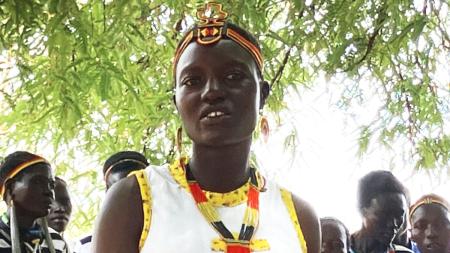Delegates Discuss Ministry Priorities

Edward Visser, Classis Atlantic Northeast: “Funding does not necessarily follow priorities. Some things are more costly than others.”
Karen Huttenga
In response to instructions from Synod 2016, the current synod (the general assembly of the Christian Reformed Church) divided into groups on June 12 to discuss which denominational ministries should be given priority for future funding.
Synod 2016 instructed denominational staff and the Board of Trustees to evaluate and prioritize all denominational programs and ministries, “with the goal of reducing the institutional footprint.” It also instructed them to “re-imagine” the ministry-share system, including possibly changing the basis on which ministry shares are calculated.
In response to this request, a detailed chart outlining all of the CRCNA denominational ministries was created and included in this year’s agenda to synod. The discussion today was a next step in that process.
Colin Watson, denominational director of ministries and administration, began the discussion with reference to Matthew 28:18-20, the Great Commission’s command to “make disciples.” He also referenced Acts 1:8, Jesus’ instruction to the church to be his witnesses in the world.
“This is what we are collectively about,” he said. What needs to be discussed, he indicated, is how and where these things are done. Watson said that the Holy Spirit will help the church discern what to do.
Each classis (regional groups of churches) delegation was asked to discuss how they would allocate denominational funding among the various agencies and ministries according to their own priorities. This discussion was for input only and was not considered binding or instructive to denominational staff.
To help guide the discussion, delegates were initially asked to participate in a survey in the weeks leading up to synod. In this survey, the delegates were asked to rate the value of several ministries to them in their work for the Kingdom.
The results of this survey turned out to be remarkably uninformative. While some slight variations were noted between Canadian and US rankings, male and female rankings, and rankings by delegates of different ages, the vast majority of delegates appeared to think that every ministry was almost equally important.
As delegates discussed the survey results and tried to work with their classis delegation to decide on funding allocations, they found it difficult to establish priorities.
James Halstead, Classis Kalamazoo, said that his group found consensus by centering on making disciples. We are called, he said, “to make disciples who make disciples.”
Edward Visser, Classis Atlantic Northeast, pointed out that funding does not necessarily follow priorities. “Some things,” he said, “are more costly than others.” Just because one ministry receives more money than another does not mean that it is valued more.
After about an hour of deliberation, delegates were asked to submit their funding allocations into an online form. The results will be forwarded to denominational staff and will be used for information as staff continue strive towards completing Synod 2016’s assignment to them.
This discussion will be picked up again at Synod 2018.
For continuous coverage of Synod 2017 including the live webcast, news, video recordings, photos, reports, liveblog, social media links, and more visit www.crcna.org/synod.


